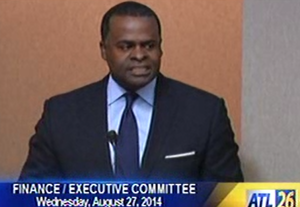 (APN) ATLANTA — At a meeting of the City Council of Atlanta’s Finance/Executive Committee on Wednesday, October 14, 2015, Council Members heard from the Atlanta-Fulton County Recreation Authority (AFCRA), which oversees Turner Field, as well as residents who are fighting to have a say in how their neighborhoods are impacted when the Braves leave.
(APN) ATLANTA — At a meeting of the City Council of Atlanta’s Finance/Executive Committee on Wednesday, October 14, 2015, Council Members heard from the Atlanta-Fulton County Recreation Authority (AFCRA), which oversees Turner Field, as well as residents who are fighting to have a say in how their neighborhoods are impacted when the Braves leave.
AFCRA recently invited developers to bid on the stadium property, a move that could undermine a concurrent planning process, the Livable Centers Initiative study, that prioritizes community participation in redeveloping the stadium area.
http://atlantaprogressivenews.com/2015/10/07/analysis-afcra-betrayed-the-turner-field-communities/
Councilwoman Keisha Lance Bottoms (District 11) doubles as AFCRA’s director.
Bottoms delivered a presentation to the committee in an attempt to assuage concerns that have been raised since AFCRA released a Request For Proposals (RFP) for 67 acres of the Turner Field Property on October 2, 2015.
“Google ‘abandoned stadiums.’ You’ll see the horror slideshow,” Bottoms said to justify the sense of urgency she feels about finding a buyer.
She acknowledged the LCI, a grant the city received to fund a planning study that requires the direct participation of community representatives. The LCI planning team is currently working on a redevelopment plan for Turner Field and the surrounding neighborhoods.
Bottoms said the LCI process will take six months longer than what AFCRA projects their RFP process will entail.
“We cannot afford to wait,” Bottoms said. She claimed that Turner Field will cost the city 5.2 million dollars per year to maintain when the Braves leave.
Later in the meeting, Councilwoman Carla Smith (District 1) pointed out that the city subsidized Underground Atlanta at a rate of six million dollars per year from the mid-1980s until WRS Inc. bought the property in December 2014.
But no one questioned whether, in light of that fact, subsidizing Turner Field for six months while the LCI process plays out would really have the detrimental effect on the City that Bottoms dramatically stated.
The hardest line of questioning came from Councilwoman Felicia Moore (District 9), who wanted to know more about a public meeting AFCRA held prior to releasing the RFP.
“Did people know that this would be their only opportunity to give recommendations?” Moore asked.
Bottoms replied that AFCRA informed the public that an RFP would be released in early October 2015.
Bottoms said she collected over two hundred comment cards where residents wrote their “hopes and dreams.”
When Moore continued to press for information, Mayor Kasim Reed stepped out of the audience and intervened.
“What I think we need to be candid about is that we haven’t had community input prior to any [other] RFP… I don’t know why Turner Field is being pulled out as a transaction where this should occur,” he said.
He cited Screen Gems, the Civic Center, Underground Atlanta, and Fort McPherson as recent examples of public land sales that transpired without community input.
“Nobody else was bashed for not doing anything,” he said, implying that therefore holding one meeting should be considered exceptional.
He also claimed to be “suffering” from the negative attention on how he has handled the redevelopment of Turner Field.
During public comment, residents of Summerhill and Mechanicsville challenged the notion that AFCRA’s public meeting adequately captured the recommendations of the community.
“There was not a robust discussion,” Suzanne Mitchell, president of the Organized Neighbors of Summerhill, said..
“It was really more informing the community that the RFP was coming down,” she said.
Jane Ridley, Economic Development Chair of the Mechanicsville Civic Association, also critiqued the meeting.
“Only twenty percent of the people [at the meeting were] from the immediate community surrounding the stadium… Anyone could come in and fill out those forms and say whatever they want,” she said.
Ridley expressed further dismay that Mechanicsville was left out of AFCRA’s RFP, a move that she felt indicated disregard for the community.
“In 1996 when the stadium needed to be built they gutted Mechanicsville for the parking lots… now we are being cast out as dirty water,” she said.
Before the meeting, members of the Turner Field Community Benefits Coalition circulated maps showing how the area covered by AFCRA’s RFP correlated almost exactly to a development proposal put forth last year by Georgia State University (GSU) and the real estate company Carter.
Bottoms rejected the idea that AFCRA’s RFP was tailored for GSU.
“That map is not drawn for anyone in particular,” she said.
In response to Ridley’s concern that the map left out Mechanicsville, Bottoms said there would be opportunities in the future to issue a separate RFP to redevelop that neighborhood.
But some residents do not see legitimacy in AFCRA’s current RFP or hypothetical future ones.
Doristine Samuels, who has lived in Mechanicsville her entire life, couldn’t be at AFCRA’s public meeting to offer her recommendations because she was working as a security guard at Turner Field. On game days, she has to work from eleven in the morning until eleven at night.
Samuels had to leave the Finance Committee meeting before the public comment period, but on her way out, she made a statement to Atlanta Progressive News.
“We want to be included in the process when they decide what they are going to do with [Turner Field]. We want to be a part of the process at every step,” she said.
Only the LCI process guarantees that level of community participation.
(END/2015)



















